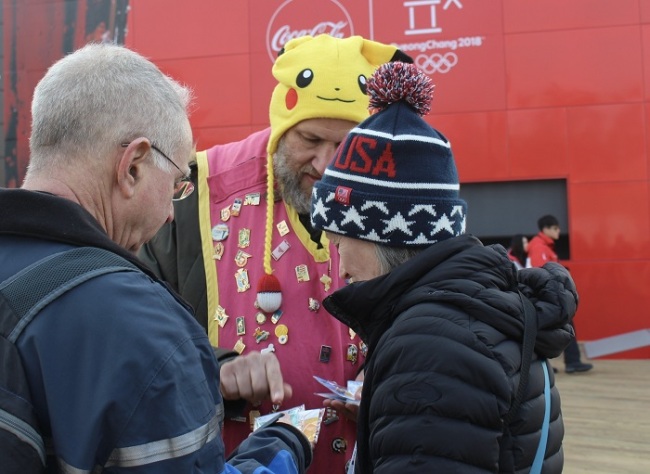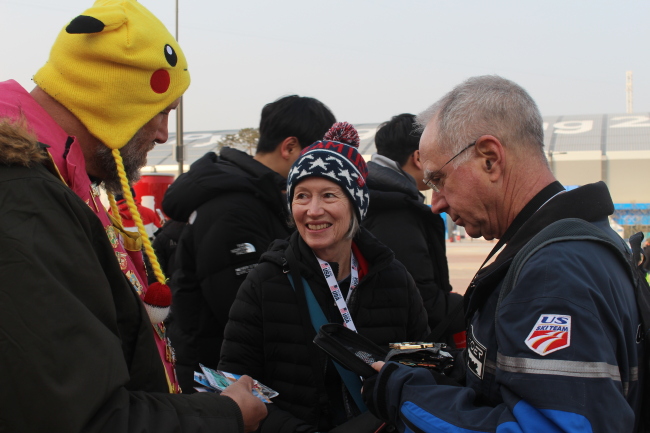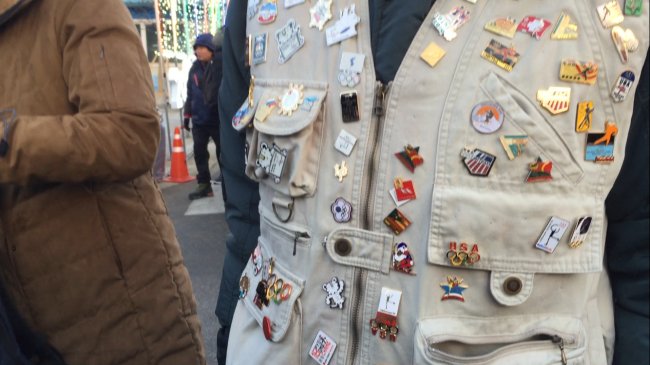GANGNEUNG, Gangwon Province -- Daniel Presburger might not have competed in any Olympic Games, but he has been to 14 of them -- all in the name of collecting pins.
 |
Olympic pin trader Daniel Presburger (center) displays his pins Saturday at the Gangneung Olympic Park, Gangwon Province. Bak Se-hwan/The Korea Herald |
While many are attending the 2018 PyeongChang Winter Olympics as spectators, Presburger came to South Korea from Los Angeles to trade tiny, colorful enamel pins and buttons that come in all shapes, sizes and designs made to commemorate the games.
Displaying his wares, the pin enthusiast and fan of the Olympic Games says it “gives you a lot of fun to get new pins from people that you don’t know.”
“They are just fun. It’s a great way to get into the Olympics getting something from it that’s not very expensive,” Presburger told The Korea Herald at Gangneung Olympic Park, one of the main venues for the games.
“The trading works any way you want. Most of the time it is one for one, but if you have a pin I really want, I‘ll give two or three. I’ve even traded 30 for a very special one,” Presburger, who started collecting pins at the 1984 Olympics in his hometown Los Angeles, said.
 |
Olympic pin traders at the Gangneung Olympic Park, Gangwon Province. Bak Se-hwan/The Korea Herald |
Pin swapping is not a well-known concept here. The good-natured trading of pins, according to the International Association of Olympic Collectors, dates back to the 1896 Summer Games in Athens.
The practice that now signifies cross-cultural goodwill during the international sports event was primarily for athletes, judges and officials back then.
“It feels always new whenever the Olympics come, and it becomes more intense to get special ones among ourselves,” Presburger said. “But what’s common is that they will spend the rest of their lives traveling around the world, building their collections and making friends. And it gets addictive.”
Big corporations have got in on the act with Coca-Cola hosting the Pin Trading Center inside the park in Gangneung, where pin-trading enthusiasts from around the world gather to trade.
“It’s been a lucky day today,” says another pin swapper, surnamed Corris, who came from Greece last week.
“I’ve brought a couple thousand pins from home, and traded 50 today,” Corris said. “Comparing to other Olympics, I think the concept of the trading is relatively new in South Korea because people keep asking me what’s so special about what I’m collecting,” he said.
 |
Photo: Park Ju-young/The Korea Herald |
But the victory comes not when procuring another metal button to the collection list, Corris said.
“The collection is just part of the satisfaction,” says the collector. “We meet, introduce ourselves, listen to people and share stories. Pins give enough reason to talk to new people, and that’s what it’s all about.”
Pins also play a key role in breaking down cultural barriers for everyone from athletes to spectators, he said.
“You don’t have to be a great athlete to get involved and understand the exchange culture in the Olympics. Like sports, it gives you a sense of unity regardless of where you came from. It unites us all.”
By Bak Se-hwan (
sh@heraldcorp.com)










